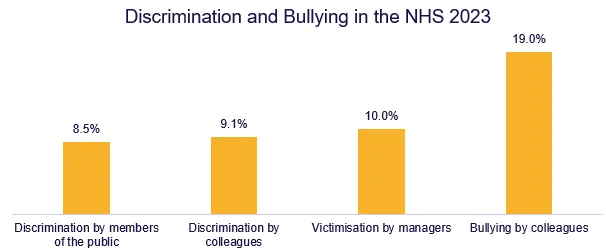Content warning: Sexual harassment, sexual assault and rape, and stalking.
Would you seek healthcare from a provider described as having an “epidemic of sexual misconduct and violence”? Recent reports reveal that this is the unsettling reality of the UK’s National Healthcare Service (NHS) (Russell 2023).
The “Sexism in Medicine” report from September 2021 revealed significant concerns, with 91% of women doctors in the UK reporting experiences of sexism at their workplaces, and 42% feeling unable to report such incidents (Hansard – UK Parliament, 2021). Additionally, a survey conducted for the “Breaking the Silence” report discovered that a third of NHS female surgical staff had been sexually assaulted by colleagues over the past five years (Hansard – UK Parliament, 2021).
Fast forward to 2023, and a Freedom of Information request submitted to every NHS Trust in England by British Medical Journal and the Guardian exposed a staggering 35,606 sexual safety incidents from 2017 to 2022, encompassing rape, sexual assault, harassment, stalking, and abusive remarks (Torjesen and Waters, 2023).

Voices from the Front Line
In this article, we examine the real and raw stories of NHS staff, who stand on the front lines of this deepening crisis, facing daily challenges that go unseen by the public eye.
According to a UNISON survey, “60 percent of nursing staff had experienced sexual harassment at work” (UNISON, 2021). And nearly a third of female surgeons reported having been sexually assaulted by a colleague, highlighting a pervasive issue within surgical specialties (BMJ, 2023).
Personal stories bring this data to life, revealing the true nature of the experiences behind the numbers. A significant portion of NHS workers report incidents involving colleagues – over half of those subjected to harassment said that their colleagues were the perpetrators, with incidents ranging from unwanted physical contact, such as undoing a worker’s bra in the corridor, to more severe cases like sexual assault and rape by fellow staff members (UNISON, 2024).
“A senior doctor used to take advantage when I was alone in one of the consulting rooms, hugging, kissing, touching inappropriately despite my requests for them to stop.”
According to a survey conducted by UNISON and Nursing Times, three in five nurses have experienced sexual harassment at work, with incidents commonly perpetrated by medical and nursing colleagues. Physical harassment included groping during medical procedures and unwanted touching. The survey highlighted that such incidents had become almost normalised, with many staff members feeling they had to endure this as part of their job (UNISON, 2024).
“A work colleague is constantly messaging me, booking onto the same shifts, and making unwanted sexual advances.”

Looking Back
The issue of sexual harassment within the NHS has a complex history, reflecting broader societal attitudes and the evolving understanding of workplace harassment. Historically, sexual harassment in the NHS was often overlooked, mirroring the societal norms of the mid-20th century where such behaviour was frequently normalised (Waugh, 2021).
The feminist movements of the 1970s and 1980s brought new awareness to issues of sexual harassment as more women entered the medical field (Baker, 2007). The introduction of laws in the late 20th and early 21st centuries provided a clearer framework for what constituted unacceptable behaviour. The Equality Act 2010 legally protected people from discrimination in the workplace and wider society, including protections against sexual harassment, setting standards for workplace conduct in the UK (UK Government, 2010).
The global #MeToo movement around 2017 had a significant impact on the NHS. It spurred a wave of transparency and encouraged more victims to come forward with their experiences. This period saw an increase in research and reports focusing on the healthcare sector, highlighting the prevalence of sexual harassment and the need for systemic change. (Cox and Jewitt, 2022).
In recent years, the NHS has taken more proactive steps to address sexual harassment. But, despite progress, challenges such as underreporting and inconsistent handling of cases persist, requiring ongoing efforts to improve education and enforce accountability (Robertson and Steele, 2023).

Understanding the Impact
Experts across psychology, law, and medical ethics emphasise the severe breach of trust and highlight the urgent need for systemic reforms within healthcare institutions. According to the report “It’s Never Ok” (UNISON, 2019), the psychological effects of such breaches can be devastating. The comprehensive survey, involving 8,000 healthcare workers, reveals the psychological trauma endured by 700 staff members who reported experiencing sexual harassment in 2018-19.
The data reveals significant impacts on workplace dynamics and mental health: 55% of the affected individuals began isolating themselves or avoiding certain colleagues and situations at work. 35% reported that the harassment adversely affected their mental health and self-confidence. Alarmingly, 40% of the respondents felt compelled to consider leaving their jobs, and some even reported contemplating suicide or engaging in self-harm.
Research by Rhead et al. (2020) supports these findings, linking experiences of discrimination or harassment to anxiety and depression, and noting that victims often suffer from moderate to severe physical symptoms. Both witnessing and experiencing these negative behaviours are associated with decreased job satisfaction and an increase in extended sick leave.
Sexual harassment instigates feelings of shame, humiliation, and fear and has profound long-term effects on victims’ mental health and career trajectories. It disproportionately affects women, with many female doctors reporting that such experiences have eroded their professional confidence and negatively impacted their careers (BMA, 2022).
Five years after the publication of “It’s Never Ok,” little has changed. According to the annual NHS staff survey in 2023, 8.67% of respondents (over 58,500 employees) said they had suffered from behaviour including “offensive or inappropriate sexualised conversation (including jokes), touching or assault” by patients or members of the public at least once in that year.
The same survey revealed that 26,000 staff members reported similar misconduct by colleagues. Of these incidents, 29% involved sexual assault, 50% reported being leered at or targeted with suggestive gestures, and 25% encountered unwelcome sexual advances or demands for sexual favours. The most common complaint involved crude “banter” or “jokes,” noted by three-fifths of those who experienced harassment (UNISON, 2024).
The survey further highlighted that around one in 12 staff (8.48%) had faced discrimination at work, the highest percentage since the question was first asked in 2019. Discrimination within the workplace, notably from managers and colleagues, was reported at a higher rate (9.07%), surpassing incidents involving patients or the public. 10% said they had been victimised by managers and almost 19% reported bullying by other colleagues.

The Response from Regulatory Bodies and Policy Changes
Of those who reported experiences of sexual harassment to the General Medical Council (GMC), only 15.1% of women felt the response was adequate, starkly contrasting with 48.6% of men. This discrepancy indicates systemic inadequacies in addressing and resolving such serious allegations (Begeny et al. 2023).
In response to these challenges, NHS England launched the first-ever sexual safety charter in September 2023, which aims to protect staff against sexual misconduct. It includes 10 core pledges such as clear reporting mechanisms, mandatory training, and the appointment of leads in domestic abuse and sexual violence.
Dr. Binta Sultan, Chair of NHS England’s National Clinical Network of Sexual Assault and Abuse Services, emphasised the importance of the charter in creating safe healthcare environments and the critical role of leadership in addressing and preventing misconduct (NHS England, 2023).
Additionally, Dr. Chelcie Jewitt, co-founder of Surviving in Scrubs, acknowledged the charter as a positive step towards protecting staff and ensuring survivor voices are heard during implementation (NHS England, 2023).
The GMC has taken significant steps to strengthen the guidelines that govern medical professionals’ conduct, with a focus on the expectation for active bystander intervention:
- Point 56: Prohibits any form of abuse, discrimination, bullying, or harassment based on personal or legally protected characteristics.
- Point 57: Forbids sexual behaviour towards colleagues that could cause offense, embarrassment, or distress, emphasising adherence to guidelines on boundaries.
- Point 58: Encourages witnesses of such behaviours to offer support to victims, confront offenders safely, and/or report incidents.
- Point 59: States leaders and managers must address and resolve any reported behaviours promptly, ensuring support for affected individuals and appropriate escalation of concerns.
These guidelines go much further than simply requiring professionals to ‘avoid misconduct’, now emphasising the duty of healthcare professionals as active bystanders.
The guidelines set a clear expectation – when medical professionals observe inappropriate behaviour, they are obliged to take actionable steps to address and report it, supporting efforts to maintain a safe and respectful environment for both staff and patients (GMC, 2024).

Towards Solutions and Safety
At RightTrack Learning, we recognise the need for proactive measures. Having partnered with NHS trusts around the UK, we’ve heard from many staff about the challenges of working in a system with challenging power dynamics. These power dynamics can leave people feeling disempowered, fearing that speaking up about their experiences could jeopardise their careers. This persistent issue reflects a deeper cultural problem within the healthcare system: too often, unacceptable behaviours that cross professional boundaries go unchallenged.
The recent updates by the GMC to the Good Medical Practice guidelines are a step in the right direction. By transforming what were previously mere suggestions into more concrete requirements, the updated guidelines empower healthcare professionals to address and resolve issues. More importantly, they help support a sense of psychological safety, providing staff with the reassurance that their concerns will be taken seriously and addressed appropriately. However, effecting real change requires more than updated guidelines – it demands the practical application of these principles.
We recognise that the leap from theory to practice is one of the biggest challenges for many people – what seems simple on paper can feel insurmountable in a real-life situation. To bridge this gap and in line with The Workers Protection Act (26 October 2024), which outlines that there is now a ‘a legal duty on employers to take reasonable steps to prevent sexual harassment of their workers’, we have updated our Preventing Sexual Harassment Training solution; an immersive, practical, hands-on workshop where we unpack real situations with the help of professional actors so participants can put their skills into practice. The sexual harassment awareness training will support colleagues to understand what classes as sexual misconduct, respect individual boundaries, learn the impact of sexual harassment and identify ways to speak out against misconduct.
All of our training is carefully designed to empower healthcare professionals through knowledge and skills development. From interactive webinars accommodating groups of all sizes, to immersive, in-person, full-day courses, we cover essential topics such as unconscious bias in recruitment, understanding harassment, active bystander intervention, and respecting personal boundaries.
Sexual harassment in the NHS is a systemic issue that requires immediate attention and action. It is urgent that all stakeholders – from healthcare professionals to policymakers – engage in dialogue and take decisive steps to tackle this problem. We encourage anyone reading this to advocate for more rigorous policies, participate in training, and support initiatives aimed at transforming workplace culture.
Bibliography
Baker, C.N. 2007. The Emergence of Organized Feminist Resistance to Sexual Harassment in the United States in the 1970s. Smith College ScholarWorks. Available at: https://scholarworks.smith.edu/cgi/viewcontent.cgi?article=1010&context=swg_facpubs [Accessed 1 May 2024].
Begeny, C, T., Arshad, H., Cuming, T., Dhariwal, D, K., Fisher, R, A., Franklin, M, D., Jackson, P, C., McLachlan, G, M., Searle, R, H., Newlands, C. (2023 Sexual harassment, sexual assault and rape by colleagues in the surgical workforce, and how women and men are living different realities: observational study using NHS population-derived weights. In British Journal of Surgery, Volume 110, Issue 11, Pages 1518–1526.
British Medical Association. (2022, August 22). Sexual harassment at work. https://www.bma.org.uk/advice-and-support/equality-and-diversity-guidance/gender-equality-in-medicine/sexual-harassment-at-work
Cox, R. and Jewitt, C., 2022. Surviving in scrubs: sexism, sexual harassment, and assault in the primary care workforce. British Journal of General Practice, 72(723), pp.466-467. Available at: https://bjgp.org/content/72/723/466 [Accessed 1 May 2024]. DOI: https://doi.org/10.3399/bjgp22X720749.
General Medical Council. (2023). Updates to Good Medical Practice Guidelines. Available at: https://www.gmc-uk.org/professional-standards/professional-standards-for-doctors/good-medical-practice/domain-3-colleagues-culture-and-safety#contributing-to-a-positive-working-and-training-environment-73517D27F43148D290C71587E2D96320 [Accessed 1 May 2024].
Hansard – UK Parliament. (2021). Sexism in Medicine Report. Available at: https://hansard.parliament.uk/Commons/2023-12-13/debates/788281AF-6F94-474B-91FD-9767009A0F3E/SexualHarassmentOfSurgeonsAndOtherMedicalProfessionals [Accessed 1 May 2024].
Hansard – UK Parliament. (2021). Breaking the Silence Report. Available at: https://hansard.parliament.uk/Commons/2023-12-13/debates/788281AF-6F94-474B-91FD-9767009A0F3E/SexualHarassmentOfSurgeonsAndOtherMedicalProfessionals [Accessed 1 May 2024].
NHS England. (2023). NHS launches first-ever sexual safety charter to help protect staff. Available at: https://www.england.nhs.uk/2023/09/nhs-launches-first-ever-sexual-safety-charter-to-help-protect-staff/ [Accessed 1 May 2024].
Rhead, R. D., Chui, Z., Bakolis, I., Gazard, B., Harwood, H., MacCrimmon, S., Woodhead, C., & Hatch, S. L. (2020). Impact of workplace discrimination and harassment among National Health Service staff working in London trusts: Results from the TIDES study. BJPsych Open, 7(1), e10. https://doi.org/10.1192/bjo.2020.137
Robertson, A. and Steele, S., 2023. A cross-sectional survey of English NHS Trusts on their uptake and provision of active bystander training including to address sexual harassment. SAGE Journals. Available at: https://journals.sagepub.com/doi/10.1177/20542704231166619 [Accessed 1 May 2024]. DOI: https://doi.org/10.1177/20542704231166619.
Russell, P. (2023) ‘Epidemic’ of Sexual Misconduct and Violence on NHS Premises. In Medscape UK Available at: https://www.medscape.co.uk/viewarticle/epidemic-sexual-misconduct-and-violence-nhs-premises-2023a1000ass?ecd=ppc_google_acq-traf_mscp_uksite-newsresources_md_inlang-uk-int&gad_source=1&gclid=Cj0KCQiA5rGuBhCnARIsAN11vgRhYm90y3aAyVYCI4uFfqZ0R2rK_gyH5KjT79fVDGN6f5mpivAYjPIaAnJ2EALw_wcB [Accessed 1 May 2024].
Torjesen, I., and Waters, A. (2023) Medical colleges and unions call for inquiry over “shocking” levels of sexual assault in the NHS In The British Medical Journal. Available at: https://www.bmj.com/content/381/bmj.p1105 [Accessed 1 May 2024].
UK Government. (2010). Equality Act 2010. Available at: https://www.legislation.gov.uk/ukpga/2010/15/contents [Accessed 1 May 2024].
UNISON (2019) It’s Never Ok. Available at: https://www.unison.org.uk/content/uploads/2019/06/sexualharassreport.pdf [Accessed 1 May 2024].
UNISON (2021) Majority of nursing staff have experienced sexual harassment at work, survey shows. Available at: https://www.unison.org.uk/news/2021/06/majority-of-nursing-staff-have-experienced-sexual-harassment-at-work-survey-shows/ [Accessed 1 May 2024].
UNISON (2024). Harassment, abuse, and discrimination have no place in a 21st century NHS. Available at: https://www.unison.org.uk/news/2024/03/harassment-abuse-and-discrimination-have-no-place-in-a-21st-century-nhs/ [Accessed 1 May 2024].
Waugh, C. 2023. Workplace harassment. In: Gender-Based Violence: A Comprehensive Guide, pp.455-470. DOI: 10.1007/978-3-031-05640-6_33.